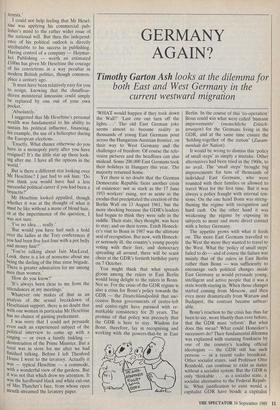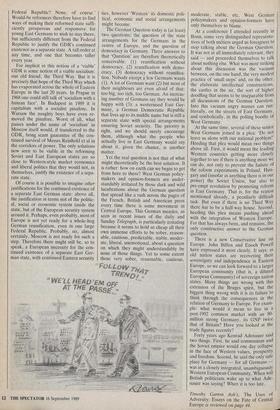GERMANY AGAIN?
Timothy Garton Ash looks at the dilemma for
both East and West Germany in the current westward migration
'WHAT would happen if they took down the Wall?' Last one out turn off the lights. • ,' The old East German joke seems almost to become reality as thousands of young East Germans pour across the Hungarian-Austrian frontier, on their way to West Germany and the challenges of freedom. Of course the tele- vision pictures and the headlines can also mislead. Some 200,000 East Germans took their holidays in Hungary this year. The majority returned home.
Yet there is no doubt that the German Democratic Republic faces another crisis of existence: not as stark as the 17 June 1953 workers' rising, not as acute as the exodus that precipitated the erection of the Berlin Wall on 13 August 1961, but the more shocking because the GDR's leaders had begun to think they were safe in the saddle. Their state, they thought, was here to stay; and on their terms. Erich Honeck- er's visit to Bonn in 1987 was the ultimate seal of recognition. But now, with Honeck- er seriously ill, the country's young people voting with their feet, and democracy spreading all around, there will be scant cheer at the GDR's fortieth birthday party on 7 October.
You might think that what spreads gloom among the rulers in East Berlin would bring delight to the rulers in Bonn. Not so. For the crisis of the GDR regime is also a crisis for Bonn's policy towards the GDR — the Deutschlandpolitik that suc- cessive Bonn governments of centre-left and centre-right have pursued with re- markable consistency for 20 years. The premise of that policy was precisely that the GDR is here to stay. Wisdom for Bonn, therefore, lay in recognising and working with the powers-that-he in East
Berlin. In the course of this 'co-operation' Bonn could win what were called 'humane improvements' (menschliche Erleich- terungen) for the Germans living in the GDR, and at the same time ensure the 'holding-together of the nation' (Zusam- menhalt der Nation).
It would be wrong to dismiss this 'policy of small steps' as simply a mistake. Other alternatives had been tried in the 1960s, to no avail. The 'small steps' brought big improvements for tens of thousands of individual East Germans, who were reunited with their families or allowed to travel West for the first time. But it was always a policy fraught with internal ten- sions. On the one hand Bonn was streng- thening the regime with recognition and hard cash. On the other hand it was weakening the regime by exposing its subjects to more and more direct contact with a better Germany.
The appetite grows with what it feeds on. The more East Germans travelled to the West the more they wanted to travel to the West. What the 'policy of small steps' failed to do — and of course the failure was mainly that of the rulers in East Berlin rather than Bonn — was sufficiently to encourage such political changes inside East Germany as would persuade young, intelligent and active people that it was a state worth staying in. When those changes started coming from Moscow, and then even more dramatically from Warsaw and Budapest, the contrast became unbear- able.
Bonn's reaction to the crisis has thus far been to say, more bluntly than ever before, that the GDR must 'reform'. But what does this mean? What could Honecker's successors do? Their fundamental dilemma was explained with stunning frankness by one of the country's leading official ideologists — the GDR still has such persons — in a recent radio broadcast. Other socialist states, said Professor Otto Reinhold, can continue to exist as states without a socialist system. But the GDR is only 'thinkable . . . as a socialist state, a socialist alternative to the Federal Repub- lic. What justification to exist would a capitalist GDR have beside a capitalist Federal Republic? None, of course.' Would-be reformers therefore have to find ways of making their reformed state suffi- ciently prosperous and responsive for young East Germans to wish to stay there, but sufficiently different from the Federal Republic to justify the GDR's continued existence as a separate state. A tall order at any time, and one that becomes taller every year.
For implicit in this notion of a 'viable' GDR is some notion of a viable socialism: our old friend, the Third Way. But it is precisely that hope of the Third Way which has evaporated across the whole of Eastern Europe in the last 20 years. In Prague in 1968 one could still talk of 'socialism with a human face'. In Budapest in 1989 it is capitalism with a socialist pinafore. In Warsaw the naughty boys have even re- moved the pinafore. Worst of all, what passes under the name of 'socialism' in Moscow itself would, if transferred to the GDR, bring scant guarantee of the con- tinued survival of Messrs Reinhold et al in the corridors of power. The only solutions now seen to be viable in the reforming Soviet and East European states are so close to Western-style market economics and liberal politics that they would not, in themselves, justify the existence of a sepa- rate state.
Of course it is possible to imagine other justifications for the continued existence of a separate East German state: above all, the justification in terms not of the politic- al, social or economic system inside the state, but of the European security system around it. Perhaps, even probably, most of Europe is not yet ready for a whole-hog German reunification, even in one large Federal Republic. Probably, no, almost certainly, Moscow is not ready for such a step. Therefore there might still be, so to speak, a European necessity for the con- tinued existence of a separate East Ger- man state, with continued Eastern security
ties, however 'Western' its domestic poli- tical, economic and social arrangements might become.
The German Question today is (at least) two questions: the question of the state arrangements for the Germans in the centre of Europe, and the question of democracy in Germany. Three answers to that 'Question' are therefore theoretically conceivable: (1) reunification without democracy, (2) reunification with demo- cracy, (3) democracy without reunifica- tion. Nobody except a few Germans wants (1). A lot of Germans want (2) but most of their neighbours arc even afraid of that: too big, too rich, too German. An increas- ing number of Germans say they would be happy with (3): a westernised East Ger- many, a German Democratic Republic that lives up to its middle name but is still a separate state with special arrangements ensuring Soviet security. The priority is right, and we should surely encourage them, although what the people who actually live in East Germany would say about it, given the chance, is another matter.
Yet the real question is not that of what might theoretically be the best solution. It is rather: how on earth can we begin to get from here to there? West German policy- makers and opinion-formers are under- standably irritated by those dark and wild lucubrations about the German question that spread like a rash across the pages of the French, British and American press every time there is some movement in Central Europe. This German measles, as seen in recent issues of the daily and Sunday Telegraph, is particularly irritating because it seems to hold so cheap all their own immense efforts to be sober, reason- able, cautious, predictable, stable, moder- ate, liberal, unemotional, about a question on which they might understandably be none of those things. Yet to some extent those very sober, reasonable, cautious,
moderate, stable, etc, West German policymakers and opinion-formers have only themselves to blame.
At a conference I attended recently in Bonn, some very distinguished representa- tives of both métiers urged us foreigners to stop talking about the German Question. It was not at all immediately relevant, they said — and proceeded themselves to talk about nothing else. What was most striking about this discussion was the vacuum between, on the one hand, the very modest practice of 'small steps' and, on the other, the elaborate intellectual constructions, the castles in the air, the sort of higher doodling that seems to be inseparable from all discussions of the German Question. Into this vacuum angry masses can run: literally, on the streets of East Germany, and symbolically, in the polling booths of West Germany.
At the same time, several of these senior West Germans joined in a plea: 'Do not leave us alone with our national problem! Heeding that plea would mean two things above all. First, it would mean the leading Western countries getting more closely together to see if there is anything more we can do, not only to prevent the failure of the reform experiments in Poland, Hun- gary and (insofar as anything there is in our power) the Soviet Union, but also to pre-empt revolution by promoting reform in East Germany. That is, for the reason mentioned already, a peculiarly difficult task. But even if there is no Third Way there has to be a half-way house. Second, heeding this plea means pushing ahead with the integration of Western Europe, For that has always been, and remains, the only constructive answer to the German question.
There is a new Conservative line on Europe. John Biffen and Enoch Powell have expressed it most clearly. It says: as old nation states are recovering their sovereignty and independence in Eastern Europe, so we can look forward to a larger European community (that is, a diluted European Community) of sovereign nation states. Many things are wrong with this extension of the Bruges spirit, but the biggest thing wrong with it is its failure to think through the consequences in the relation of Germany to Europe. For exam- ple: what would it mean to live in a post-1992 common market with an 80- million strong Germany, its GNP twice that of Britain? Have you looked at the trade figures recently?
Forty years ago Konrad Adenauer said two things. First, he said communism and the Soviet empire would one day collapse in the face of Western values, prospenty and freedom. Second, he said the only safe place for Germany — for all Germans — was in a closely integrated, unambiguously Western European Community. When will British politicians wake up to what Ade- nauer was saying? When it is too late.
Timothy Garton Ash's, The Uses of Adversity: Essays on the Fate of Central Europe is reviewed on page 44.



































































 Previous page
Previous page